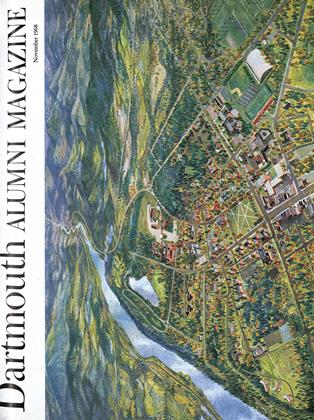The Nathan Lord House on College Street, formerly a College dormitory and once the home of the Rev. Nathan Lord, sixth president of Dartmouth, has been converted into an Afro-American Cul- tural Center to serve the 89 black undergraduates at the College this year and others interested in Afro-American affairs. Operated by the Dartmouth Afro-American Society, the center's educational and social programs will be open to all undergraduate students.
The center was authorized for a two-year trial period by the Board of Trustees, acting on the recommendation of the Committee on Equal Opportunity appointed by the Trustees last April to explore how Dartmouth is meeting its responsibilities in this area. In making its recommendation, the committee noted, "The black student desperately needs a place where he and his brothers can come together in common - a place where a cultural and social base can be established from which new strength can be gained to meet the challenges faced by any Dartmouth undergraduate."
The chairman of the committee, Attorney John R. McLane Jr. '38of Manchester, N. H., sees the new center "as a place where black students at Dartmouth can learn more of the cultural heritage of their race and the accomplishments of black peoples, and where the white student can learn about an important aspect of American life about which he probably knows very little."
Although the idea of an Afro-American Cultural Center had often been discussed on campus during the past year, the impetus for its actual establishment was provided last spring by the three-year old Dartmouth Afro-American Society, in presentations to the Committee on Equal Opportunity. A student member of the committee, William McCurine Jr. '69 of Chicago, who is president of the Dartmouth Afro-American Society, feels that the center "will provide cultural roots which are now absent."
Among the activities projected are colloquia and weekend meetings with black students from New England colleges. A suite in the center has been reserved for visitors to the campus, such as guest speakers and performers, to provide maximum opportunity for communication with students. The Lord House will also contain a special library and record collection. While a limited number of students who have program responsibilities will live there, the Afro-American Center is not a dormitory, and the established pattern of integrated student living will not be altered.
 View Full Issue
View Full Issue
More From This Issue
-
 Feature
FeatureThe Woes of the Hoit Brothers
November 1968 By John Hurd '21 -
 Feature
FeatureTHE VICE VERSA VIRTUES
November 1968 -
 Feature
Feature1953's Triple Alliance
November 1968 By CLIFF JORDAN '45 -
 Feature
FeatureANOTHER COLLEGE YEAR BEGINS
November 1968 -
 Article
ArticleWith the Big Green Teams
November 1968 -
 Class Notes
Class Notes1935
November 1968 By RICHARD K. MONTGOMERY, C. HALL COLTON, THOMAS E. WILSON







